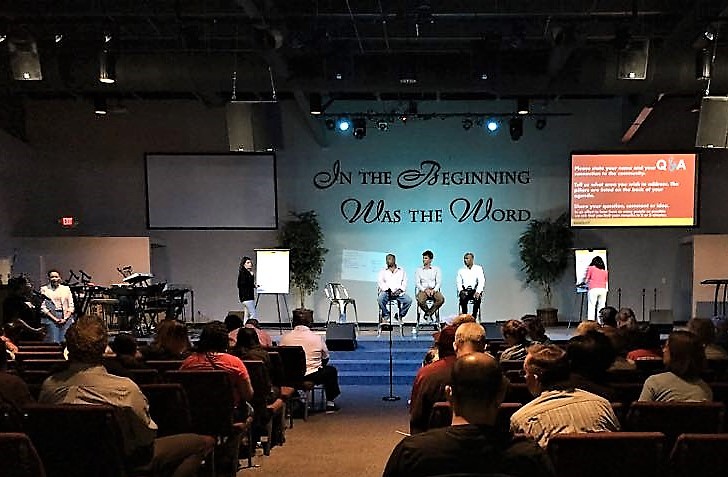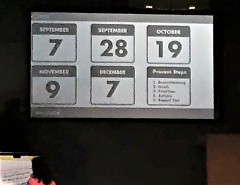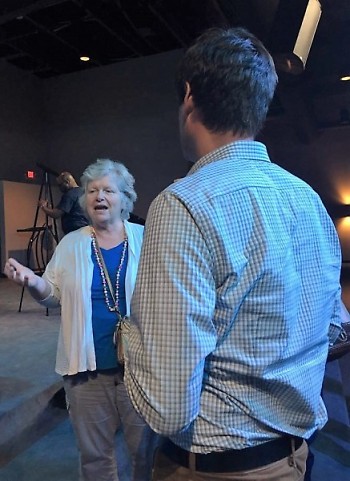On July 27, 2017 I along with approximately 80 residents from the Southeast side and surrounding areas attended the Amplify GR Community Listening meeting at Living Word Church, 1534 Kalamazoo SE.
A non-profit funded by the Doug and Maria DeVos Foundation and Cheri DeVos Foundation, Amplify GR has partnered with Rockford Construction to purchase 32 properties on 35 acres in the Boston Square, Cottage Grove, and Madison Square neighborhood, mostly along Kalamazoo Avenue south of Hall and along Cottage Grove east of Madison. These are predominantly Black areas of a city that has been rated one of the worst economically in the nation for African-Americans.
The meeting began with four people up on a raised stage looking down on the members of the community. They were: Willie Patterson and Jon Ippel, Community Engagement Specialist and Executive Director of Amplify GR, respectively; Brad Mathis from Rockford Construction; and Eureka Smith, facilitator.
After forty minutes of opening comments and an explanation of the four pillars of Amplify’s strategy - education, jobs, affordable housing, and health - the meeting opened up to questions and comments from the community, with microphones available for all to speak.
Community comments
LaDonna Norman, who rents in Wyoming but still maintains her residence with her grandfather on Watkins Street, said that the city of Grand Rapids is becoming the city of Grand DeVos, referring to the involvement of DeVos money in creating Amplify GR, as well as the many non-profits, arts organizations, buildings, and developments in Grand Rapids that bear the DeVos name and/or receive DeVos money.
“This neighborhood doesn’t belong to us anymore,” said Norman of the Rockford Construction purchases over the last three years. “You’ll put in businesses we don’t frequent because we can’t afford them. They want to push poor Black people out of this area and out of Grand Rapids.”
Alicia Reece described how she is working two jobs and rarely sees her children, yet the home she was renting was sold. “"I need to gross three times the price of rent in order to rent a house. Rents of $1300 to $1400 aren't for us; it's for the business people and professionals."
White savior mentality
Tempest Warfield, who has family living in the Boston Square area, said that neighbors are worried about taxes going up or losing their homes, and they just wanted to know what’s going to happen. “People are feeling bullied by the wealthiest family in the area. People want to keep their homes and leave a legacy for their kids.”
“You’re talking about purpose-built communities,” said Warfield. “I’m trying not to take offense. Because the people here have purpose: they’ve been working to keep their homes, to pay their taxes, to maintain. It may not look like much to you, but given all they’ve had to overcome, it’s a lot. We need to talk about race, about class, about money. We all know the history, the culture. When are we going to get a totally transparent initiative that's not West-Michigan-nice?" She added, “Be very careful of the white savior mentality. Don't look at statistics and think you need to come in and save the area.”
Dana Knight, who is part of Black Lives Matter, talked about gentrification and racism. She responded to Amplify GR’s plans for education and jobs in this way, building on Warfield’s comments. “We’ve got schools. We’ve got jobs. They don’t hire Black people.”
Knight continued, “I’ve got degrees. But they hire safe Black people, like you [pointing to Mathis]. Because they’re not fearful of you, but they don’t want anyone who is outspoken, who is going to say anything or tell the truth. That’s the history of white Grand Rapids as well.”
Would you leave?
Some of the audience was supportive of Amplify GR. Paula Collier said, “Every time change comes, there are consequences." Accepting this, she stated that she supported Amplify GR and would work with them.
Ken Miguel-Cipriano said, “What if we decide we don't want you here? Would you leave? You were never invited here.” Miguel-Cipriano wondered if 70 percent of residents said they didn’t want AmplifyGR in Southtown, would they go? Jon Ippel, executive director of AmplifyGR, said, “We would just have to get back up and move forward and do it better.” Some said that perhaps he meant to show that AmplifyGR would persevere, but many in the crowd groaned at the implication that their voices wouldn’t really make a difference, and that further action would be needed.
Community land trust
After the meeting, I spoke briefly to Ippel and asked if they had considered putting the real estate into a trust for the community itself to own and develop. He responded that they were looking at that option. His concern was that many of the commercial properties on Cottage Grove have a lot of contamination, and would need to be cleaned up. He mentioned the possibility of buildings that could house small businesses for emerging entrepreneurs.
I asked if there was a way for neighbors to cooperatively own bigger businesses and the actual buildings so that they could make the bigger profits, in the way that Rockford Construction does. Ippel responded that they were looking at that.
What does community ownership look like?
The comments from the audience raised the question: what does community ownership look like? Some ideas and critiques based on the feedback I heard:
- Community ownership doesn’t look like four people on a raised staged, elevated in front of the rest of the community.
- Community ownership may not look like hosting the meeting in a church, or at least not starting the meeting with a Christian prayer, which excludes some.
- Community ownership does look like acknowledging white complicity in structural racism and classism, including in allowing companies to leave without cleaning up their toxic mess. It means giving the resources to the most affected people themselves because they have so often been denied bank loans, environmental justice, and access to resources that white middle-class and rich people gain with unearned privilege.
- Community ownership does look like meetings that are hosted by the community itself, with food (which Amplify GR has provided at the last two meetings), childcare (updated: which they provided for the most recent meeting) and lots of notice and invitations from people who know each other. To achieve true ownership, the community may need more conversation happening within the neighborhood blocks themselves, as many residents cannot make the meetings, nor can they visit the AmplifyGR building during 8-to-5 business hours.
- And finally, community ownership does not look like saying that you will persevere if 70 percent of the community says they don’t want you here.
Lack of trust
Future AmplifyGR meetings have been announced - the next one will be September 7 at Madison Place. But some residents said they weren’t sure they would be returning, as they felt that Amplify GR had already decided what they’re going to do.
It seems clear that the distrust of the DeVos family and Rockford Construction - who have been involved in the gentrification of the Wealthy Street Corridor, the West Side, and Belknap Lookout, among others - is a distrust deeply ingrained in much of the community.
The idea that comes to mind is a Truth and Reconciliation process, much like the model used in South Africa when apartheid ended. In this process, the decision-makers of the city - elected officials, those with influential money and power, as well as the regular citizens who have benefited from and perpetuated systemic oppression - must listen to those they’ve wronged, and commit to what they must do to make it better, including moving resources into the hands of those who have been exploited. A process like this would need to happen in the most affected neighborhoods, with a special effort to reach out to the marginalized, including those who are or have been incarcerated.
This may seem like an extreme measure, but until we can truly face our complicity in racism, classism, and other forms of oppression and bias, and take ownership of the harm done, those who have power will continue to evade true community ownership and empowerment.
The Rapidian, a program of the 501(c)3 nonprofit Community Media Center, relies on the community’s support to help cover the cost of training reporters and publishing content.
We need your help.
If each of our readers and content creators who values this community platform help support its creation and maintenance, The Rapidian can continue to educate and facilitate a conversation around issues for years to come.
Please support The Rapidian and make a contribution today.


